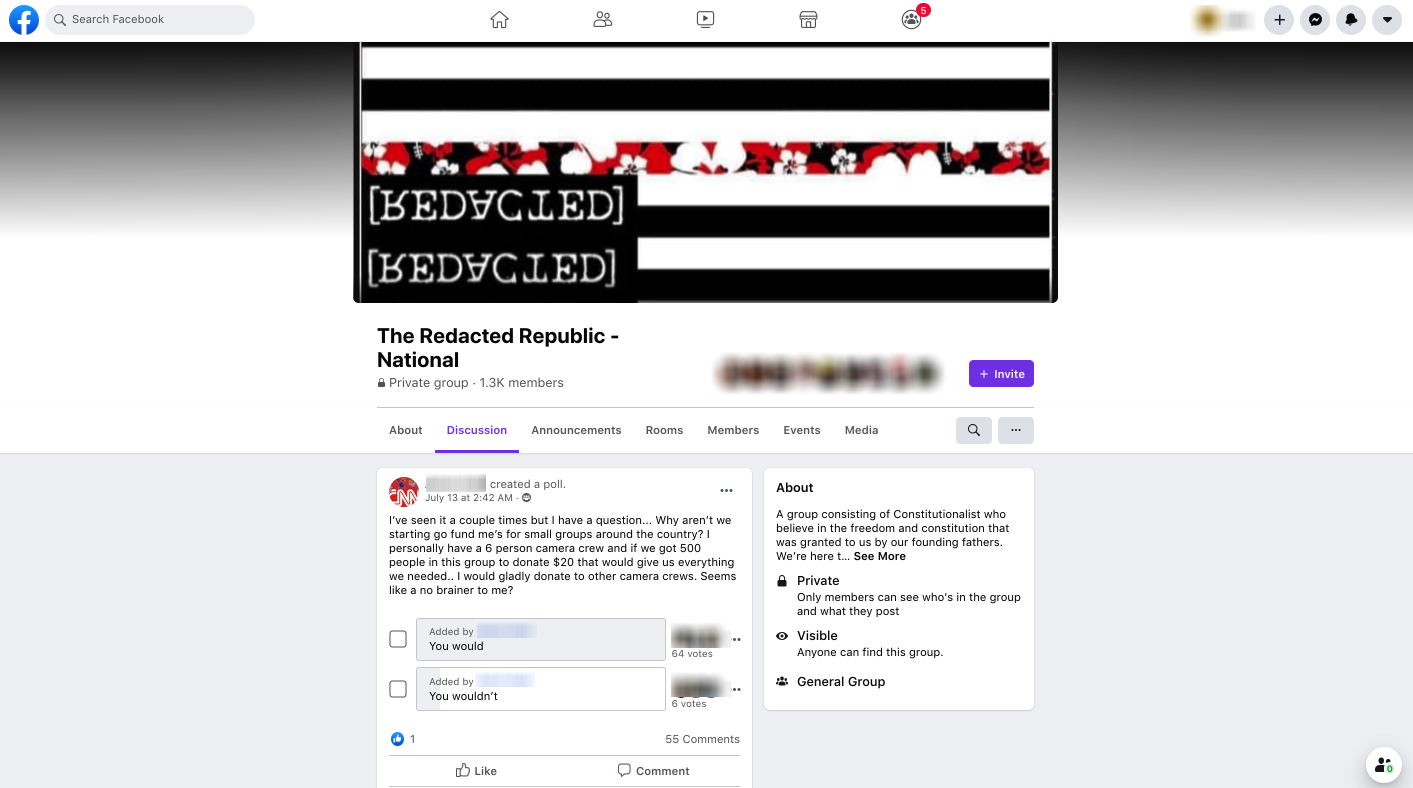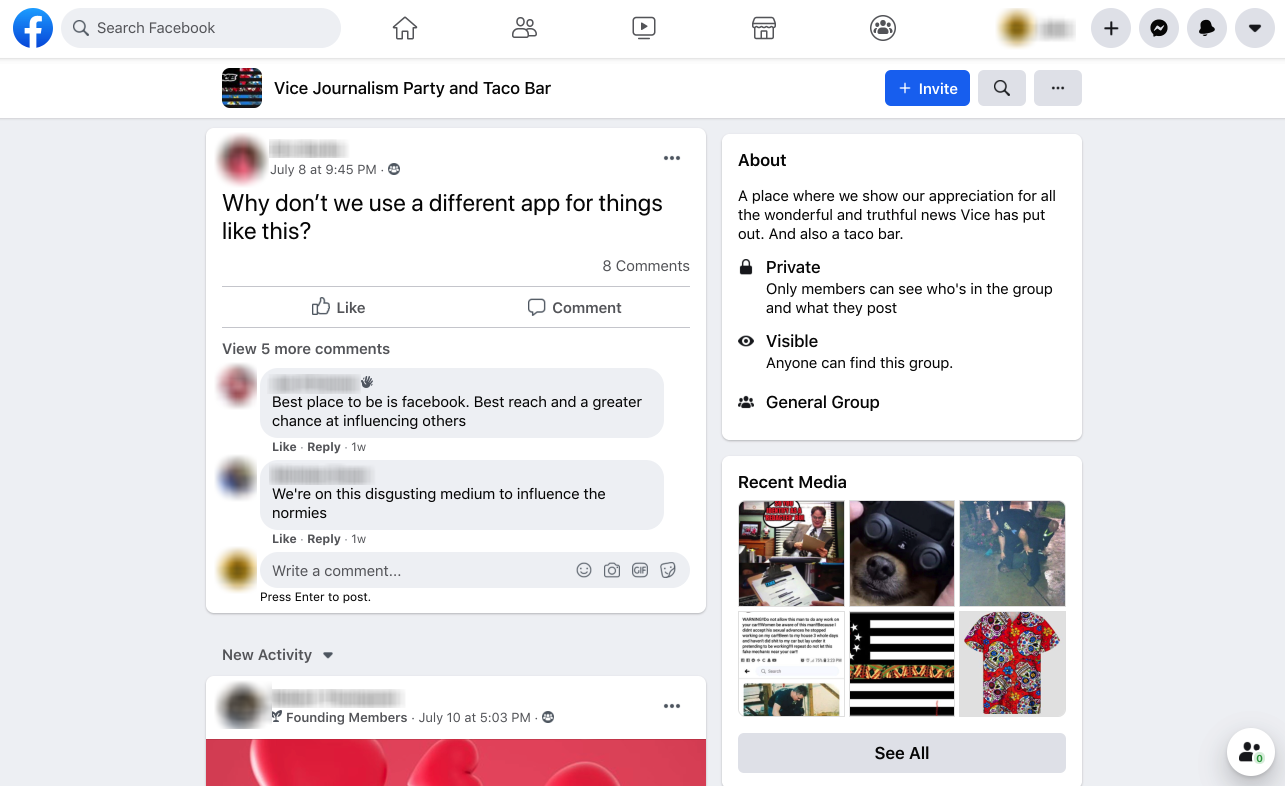The Boogaloo Bois Are All Over Facebook
The anti-government Boogaloo movement is thriving on Facebook under an array of code names, where followers are circulating links to Google Drives containing manuals on bomb making, how to be a getaway driver, and how to murder people with your bare hands, an investigation by the Tech Transparency Project found.
The group, which tracks extremist movements on social media, identified 110 Boogaloo groups that were created since Facebook designated it a “dangerous organization” and banned it from the platform on June 30. At least 18 of them were created on a single day.
Some of those groups have already amassed thousands of members, and are distributing documents including “Al Qaeda kidnapping manual” and the “Army Sniper Manual,” as well as reports on bombings such as the 2005 attack on London’s transport system, which left 56 dead.
One such drive is labeled “For Duncan Lemp,” a reference to the 21-year-old anti-government extremist who became a martyr in Boogaloo circles when he was killed by Maryland police in March. Since then, Lemp’s face and name have become a mainstay of Boogaloo networks. So-called Boogaloo Bois have even appeared at Black Lives Matter rallies with signs demanding “Justice for Duncan Lemp.”
In some cases, the presence of the Boogaloo movement may be even more troubling than it was before. The distribution of entire folders containing instructions for violent acts is an escalation even compared to just a few months ago, when members were just pasting recipes for Molotov cocktails directly into Facebook groups.
“The biggest concern is the ability to reach such a large number of people,” said Katie Paul, director of the Tech Transparency Project. “That increases the number of people who may be unstable. One person could take these manuals, find them useful, and carry out a lone-wolf attack.”
Boogaloo started picking up steam last year on 4chan and other fringe sites as memespeak for a civil war or violent uprising. In the last six months, it’s grown into a sprawling movement that’s pulled in hard-line libertarians, shitposters, anti-government extremists, and some white supremacists.
Facebook was initially home base for the movement, as detailed in a report by the Tech Transparency Project in April — around the same time so-called Boogaloo Bois began showing up to anti-lockdown protests heavily armed, wearing Hawaiian shirts.
It wasn’t until the Boogaloo movement was linked to several acts of real-world violence that Facebook and other tech companies began scrambling to kick adherents off their platforms. For example, in late May, three men in Nevada were arrested for allegedly conspiring to throw explosives into a Black Lives Matter protest in Las Vegas. Prosecutors said the men were aiming to provoke a violent standoff with police. All three arrestees had met on a centralized Boogaloo hub on Facebook, and then moved their discussion to smaller groups dedicated to action in Nevada. They’re now facing state terrorism charges.
Also in late May, two men who’d met on a Boogaloo Facebook group — including an Air Force staff sergeant— allegedly conducted an ambush attack on federal security officers in Oakland, killing one.
One key characteristic of the Boogaloo movement is its adaptability in the face of social media crackdowns. Back in January, well before the movement was on many extremism experts’ radars, Boogaloo groups had already adopted codes like “Big Luau” and “Blue Igloo” to make them harder to track.
Once moderators caught on to those codes, the groups adopted newer slang, such as “Alphabet Bois” (a reference to federal agencies like DHS, ATF, FBI, CIA), or just “[redacted]”. After Facebook’s action against the Boogaloos in June (it banned hundreds of Boogaloo groups and users), adherents reconvened on MeWe, an obscure app. There, they devised a plan to create new Facebook groups with new language — including references to CNN and VICE News.
“It’s a whole new theme for their movement,” said Paul. “They use words like ‘cameras and film’ instead of ‘guns and ammo’.” Some Facebook group administrators even police discussions to ensure nobody actually uses the word “boogaloo.”

On a press call in June, representatives from Facebook’s counterterrorism department acknowledged the challenges posed by the Boogaloo movement and its ever-evolving lingo. They said that while they’d try to stay on top of it, they’d also likely continue to lean on researchers and journalists to help them decipher terminology and determine what’s dangerous rhetoric versus sarcastic shitposting.
“Since we banned a violent network tied to boogaloo, we have seen continued changes in language and tactics to try to evade our detection.”
“Since we banned a violent network tied to boogaloo, we have seen continued changes in language and tactics to try to evade our detection,” a spokesperson for Facebook told VICE News. “Our team of experts has been expecting this behavior and we are updating the language and symbols we use to identify this network weekly to continue to enforce our policies.”
But Paul is skeptical, given the persistent presence of the Boogaloo movement on Facebook.
“Facebook has a counterterrorism team of 350 people,” she said. “These groups are not hard to find if you’ve been following the movement and understand what language they’re using. All you’d need is at least one dedicated person to make sure this movement stays deplatformed.”
Facebook says that there are specific specialists within that 350-person team who are focused on tracking trends in language and tactics from what they consider to be a violent core of the Boogaloo network. The company would not say specifically how many employees, if any, are focused exclusively on tracking the Boogaloo movement.
And yet companies like the popular gaming app Discord have managed to draw a hard line on boogaloo activity and have prevented the movement from reorganizing on the platform. “If journalists, researchers and Discord can track the movement without the same resources that a multibillion-dollar company like Facebook has, then Facebook is also capable of doing it,: Paul said.
Moreover, Boogaloo groups are easy to find because Facebook’s own algorithm recommends them, Paul said.
While the Boogaloo movement has established an infrastructure outside of Facebook, it clearly still relies heavily on mainstream social media platforms to recruit. “We’re on this disgusting medium to influence the normies,” one person wrote.

Some groups are relying on Facebook to fundraise for the movement. For example, in July, one group was selling Boogaloo stickers to raise money for Lemp, Breonna Taylor, and Mike Dunn, who has been coordinating Boogaloo and militia activity in Virginia but recently lost his job. On another page, a user suggested that all 500 members donate $20 apiece, which could help outfit small, active cells with tactical gear and weapons.
A month prior to Facebook’s decision to ban Boogaloo they adjusted the algorithms so that the company wouldn’t recommend Boogaloo pages or groups to users. But this hasn’t been effective either; Paul noted that many of the new Boogaloo groups included in the Tech Transparency Report were found thanks to Facebook’s suggestions.
A spokesperson for Facebook said they hadn’t seen the Tech Transparency Project report yet, so was unable to comment on specific findings, or able to say whether the groups included in the report these groups would fall under the “dangerous organization designation” applied to what the social media company describes as a core, violent Boogaloo network.
Cover: A gun-rights rally drew about a hundred Boogaloo Bois to downtown Richmond, Virginia on July 4, 2020. (Tess Owen/VICE News)
DMT.NEWS
via https://www.DMT.NEWS
Tess Owen, Khareem Sudlow

